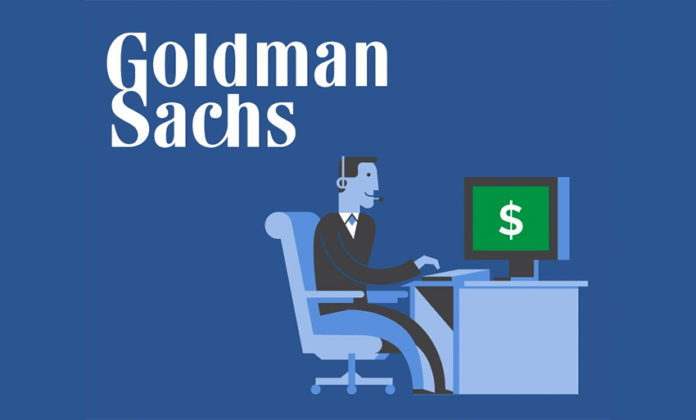Goldman Sachs is changing the traditional banking industry reliant on bank tellers and in-person service. The bank recently launched GS Bank, an online bank that promises a 1.05% APY and requires a minimum deposit of only $1. For a bank with a reputation for wealthy clientele, this shift might have come as a surprising change within its private wealth management arm. GS Bank is an FDIC insured savings bank that evolved from the acquisition of GE Capital Bank, an online retail bank formerly owned by General Electric. The online bank currently has approximately $114 billion in total deposits, a small amount compared to J.P. Morgan’s $1.1 trillion U.S. deposits.
The 56% drop in first quarter profits this year has led to Goldman Sachs diversifying its assets in the direction of retail banking to recuperate its losses. Goldman may be new to the online financial services industry, but it is already looking to broaden its reach within online retail banking to solidify the future growth of its company.
Impact of Financial Reforms on Goldman
The 2010 financial reform legislation Dodd-Frank is having far reaching consequences in the way the traditional banking sector in the U.S. operates. Stricter financial regulations limit the types of business banks can engage in and require higher minimum capital holdings than prior to the 2008 financial crisis. Undoubtedly, GS Bank’s focus on acquiring deposits is a prudent path forward for Goldman.
In particular, an FDIC proposal would require megabanks such as Goldman to rely on long term funding from stable sources such as deposits. The goal of the FDIC proposal is to ensure that banks with over $250 billion in total assets can weather economic crises without scrambling for adequate funding over a one year period. The small but growing amount of deposits GS Bank currently has will supplement Goldman’s long term funding in light of the FDIC recommendations.
Venture Into Fintech
Goldman’s venture into GS Bank is a lower cost method for the financial juggernaut to promote its Main Street charm and shed the negative Wall Street image frequently associated with it in the years since the economic crisis. Goldman’s plans to continue growing the company in today’s high tech finance industry while being in compliance with Dodd-Frank and the FDIC are evident in the company’s recent requisitions. The bank recently acquired Honest Dollar, a fintech startup that helps individuals start retirement accounts.
Online banks are increasingly more profitable than brick and mortar bank outlets as consumersflock to do their banking online and outlet banking declines. A decade ago, online banks stood at 4% of the market share. Today they make up 12% of the banking industry. Tellingly, 54% of respondents in an SNL Financial survey said that they would switch banks based on the quality of service provided on their mobile apps. Goldman’s move makes financial sense for the company in an era of online and mobile services.
What GS Bank Signals for the Banking Industry
Traditional Banks are Diversifying
In the wake of stricter financial regulations, big banks will continue the trend into retail banking to amass deposits. The net stable funding ratio requires banks to maintain funding that accounts for liquidity risks arising from their derivatives, assets and off-balance sheet activities. Banks like Goldman will continue to shift towards catering to the everyday consumer and avoid a liquidity crisis in an economic downturn.
Spotlight on Fintech
Banks are partnering with startups at an unprecedented rate. Major players like Goldman are starting to focus on online only services; a harbinger of change. Ally Financial bought TradeKing Group, an online brokerage firm, for $275 million just last month. Requisitions of fintech startups by big banks signal their strategic belief in technology driven banking as the next stage of banking.
Convincingly, investment into fintech firms numbered at $19 billion last year compared to a meager $1.8 billion five years ago. In the light of these swift changes, Goldman’s venture into the online sphere no longer seems an anomaly but more like a prudent business decision. Banks big and small are leaping quickly into the fintech arena due to its profitability.
Adaption of Big Banks to Consumer Needs
Many consumers today commonly access their bank accounts on the go. Others use online payment platforms like Paypal or Alipay. With banks shuttering brick and mortar bank outlets, the banking industry needs to revamp their services or be left behind. Bank of America has closed 10%of its 5,328 U.S. outlets as of last year.
With banks struggling to profit on deposit interest payouts coupled with low loan interest earnings, this marks the start of the end of traditional banking. While banks are closing their outlets, online payment companies are doing remarkably well. Alipay signed up over 81 millioncustomers within 8 months of its money market launch. Just across the border in Canada, the five largest banks are in the midst of launching Apple Pay for their consumers. The banking industry is already experiencing a desire for highly tailored and personal service as well as user friendly apps, paving the way for banks of the future.
How Banks Should Respond to GS Bank
Venture Into the Fintech Arena
Big banks like Goldman have already started to veer towards fintech, a strong sign that banking of the future will be increasingly online and mobile. The traditional reliance on in-person banking is steadily declining. Banks are recognizing consumer pattern shifts towards self-service tech-savvy apps and are responding accordingly.
A note of caution: banks should be careful of upcoming regulations to the fintech industry. With regulators striving to protect consumers and ensure safe business practices,the Treasury Department is soon publishing a list of recommendations for marketplace lending. This comes in the wake of a malware attack on four Australian banks’ apps stealing login information and thwarting security countermeasures. Companies that launch banking mobile apps should anticipate ensuring their software stays ahead of hackers eager to find new flaws in even the most trusted high-tech financial security systems.
Cater to Millennials
The banking industry has long catered to multiple generations that trust in its institutions. The millennial generation has already begun to disrupt the long held notion that consumers should rely on big banks for their financial needs. According to a study by Scratch, a division of Viacom, banking is at the greatest risk of disruption by this generation. 10,000 respondents were asked about 73 companies spanning 15 industries. 73% of millennials in the survey indicated more excitement about product offerings from Google, Amazon, Paypal or Square than their nationwide bank. This adds fuel to why banks like Goldman and BoA are acquiring fintech startups to overhaul their image among millennials. In the U.S. alone, millennials number 84 million. That is huge market to cater to and win over.
Focus on Omnichannel Banking
By putting their customers first and foremost using a personal touch, banks would be more likely to win over customers than to continue losing them.As 86% of customers halt their relationship with a company, banks and the fintech industry as a whole should focus on a personalized customer experience for their banking clientele given their vast numbers.
HDFC Bank, the second largest private bank in India noted that more than 55% of their clients use multiple channels for their banking needs. McKinsey research revealed that more than two thirds of European banking customers would be highly adapted to the internet for banking and focussed on a self-directed banking relationship by 2020. Their estimates also indicate significant cost savings for banks by shifting from a traditional to a digital banking landscape.
GS Bank is a prudent and timely move by Goldman. By utilizing the technology that exists today, the bank was able to start a lower cost online bank and potentially reach a broader range of customers. Broader trends in online banking signal that Goldman’s investment into GS is a safe one. RBS data show that over-the-counter banking has fallen over 40% in the U.K. since 2010. During the same period, the bank’s online and mobile banking traffic has increased four-fold. Fintech is a trend that will continue into the future of banking as technology becomes more advanced and creates a highly personalized, user friendly customer experience. Banks and the fintech industry are already moving quickly to keep up with today’s tech-infused landscape. The banking building blocks of the past are paving the way for the omnichannel processes of tomorrow.





